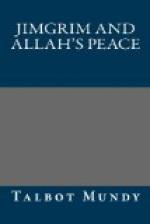We caught sight of the Dead Sea presently, bowling past the Inn of the Good Samaritan and beginning to descend into the valley, twelve hundred feet below sea level, that separates Palestine from Moab. The moon shone full on the water, and it looked more wan and wild than an illustration out of Dante’s Inferno. There was no doubt how the legends sprang up about birds falling dead as they flew across it. It was difficult to believe that anything could be there and not die. It was a vision of the land of death made beautiful.
But the one-eyed Arab on the rear seat began to sing. To him that view meant “home, sweet home.” His song was all about his village and how he loved it—what a pearl it was—how sweeter than all cities.
“’Ark at ’im!” The driver stopped the car to fill his pipe. “You’d think ’e lived in ‘eaven! I’ve fought over every hinch o’ this perishin’ country, an’ tyke it from me, guv’nor, there ain’t a village in it but what’s composed of ‘ovels wi’ thatched roofs, an’ ‘eaps o’ dung so you can’t walk between ’em! Any one as wants my share o’ Palestine can ’ave it!”
We bumped on again down a road so lonely that it would have felt good to see a wild beast, or an armed man lurking in wait for us. But the British had accomplished the impossible: They had so laid the fear of law along those roads that, though there might be murders to the right and left of them, the passer-by who kept to the road was safe, for the first time since the Romans now and then imposed a temporary peace.
At last, like two yellow streams glistening in moonlight, the road forked—one way toward Jericho. The other way appeared to run more or less parallel with the Dead Sea. At that point the one-eyed Arab left off singing at last and clutched the driver’s shoulder.
“All right! All right!” he answered impatiently, and stopped. “Out you get, then!”
He did not expect the tip I gave him. He seemed to think it placed him under obligation to wait there and talk for a few minutes. But my one-eyed guide waved him away disgustedly with the hand that did not hold my bag, and we stood in the road watching until he vanished up-hill out of sight. Then the guide plucked my sleeve and I followed him along the righthand road. We walked half a mile as fast as he could set foot to the ground.
At last we reached a pretense of a village—a little cluster of half-a-dozen thatched stone huts enclosed within one fence of thorn and cactus. Everything showed up as clearly in the moonlight as if painted with phosphorus. The heavy shadows only made the high lights seem more luminous. A man and two donkeys were waiting for us outside the thorn hedge. The man made no remark. My guide and I mounted and rode on.
Presently we turned down a track toward the Dead Sea, riding among huge shadows cast by the hills on our right hand. The little jackals they call foxes crossed our path at intervals. Owls the size of a robin, only vastly fluffier, screamed from the rocks as we passed them. Otherwise, it was like a soul’s last journey, eerie, lonely and awful, down toward River Styx.




